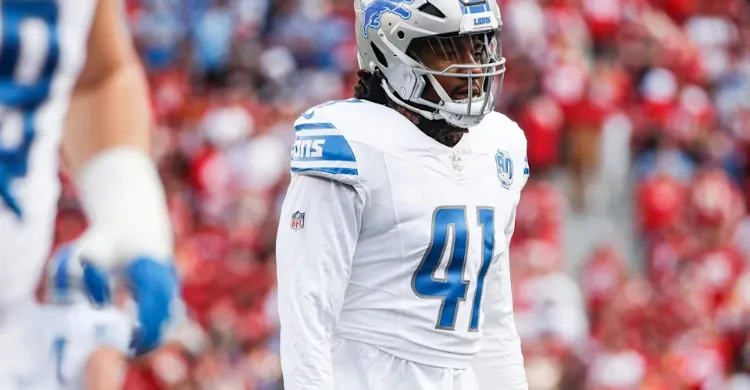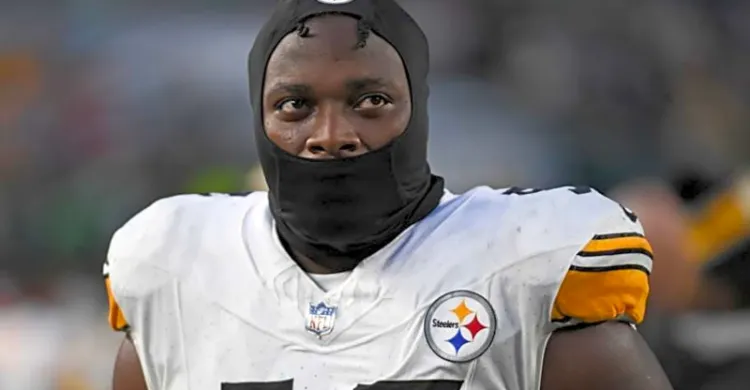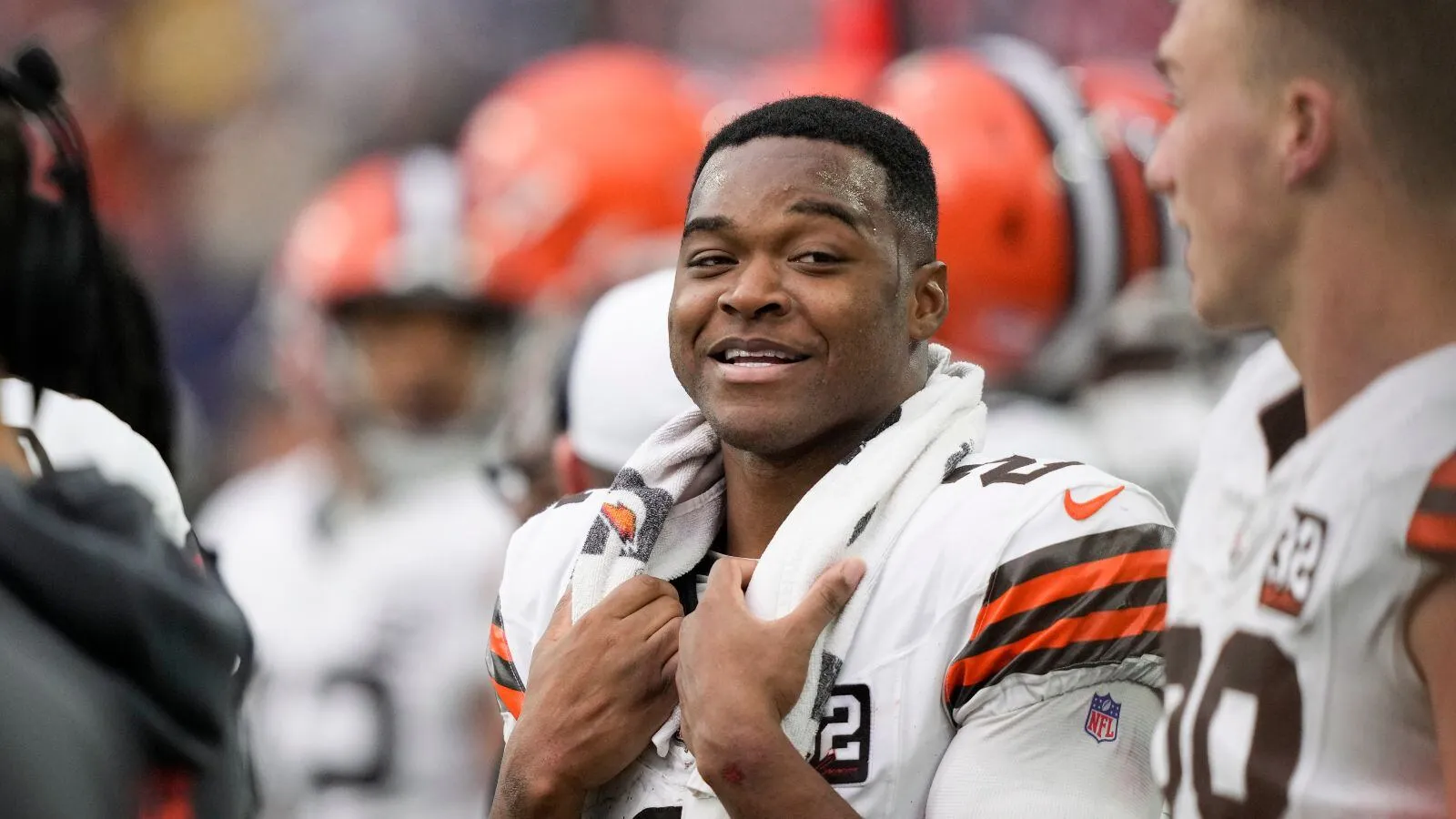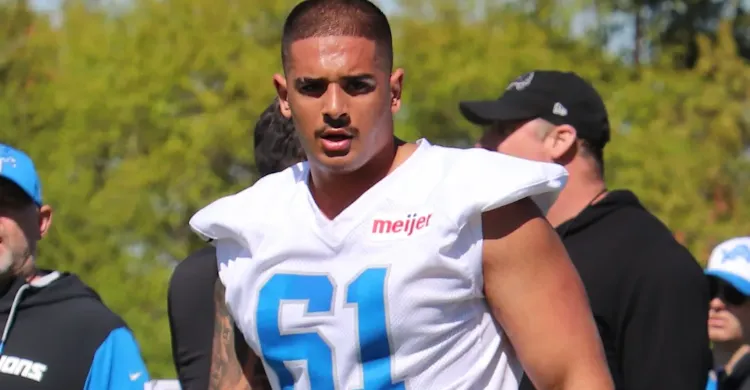The Detroit Lions' defense has drawn a significant amount of scrutiny due to the pass-rush and sack totals falling short of expectations over the past couple of seasons.

Aidan Hutchinson has emerged as one of the top young defensive ends in the National Football League, but the Lions have struggled to find a consistent complement to him at the opposite defensive end position.
Last season, the Lions' defense was hit with a wave of injuries that severely sapped their depth. As a result, the pass-rush production dipped. Now, many pundits believed the defense would benefit most from adding one of the top edge rushers in this year's draft.
However, Holmes did not draft a player at the position until the sixth-round. He's often spoke of the difficulty acquiring a player at one of the premier positions in the game, and has noted that there is a finite amount of elite options. This, in turn, makes adding one difficult.
Because the Lions already have one of the few top options in Hutchinson, he feels as though the fan base is upset because they do not have a second to go with him.
“They’re hard to find, they’re hard to get, they’re hard to acquire," Holmes said during an appearance on 97.1 The Ticket. "But I have felt like, ever since we have acquired Aidan Hutchinson, as great of a player he is, I have always felt like the fan base is almost mad. Like, they’re mad because we have Aidan Hutchinson. Because, now, he’s so good, well why don’t you have two of them."
Holmes has received plenty of questions about the state of the team's pass-rush, and openly admitted the difficulty of finding two elite options to pair together. The Lions also have a very thorough player evaluation process, and as a result they have high standards for players that they elect to bring in.
"I have been curious, the teams that have those five or six elite edge rushers in other media markets, I have been curious. ‘Okay, we have an elite edge rusher, all we’re gonna ask is about edge rusher.’ You know who those players are," Holmes explained. "When you go to those cities and those media markets, all you do is get questions about edge rusher. You have an elite one, but all you’re asking about is, ‘How come you don’t have another one?’ Now you get into the — are you trying to build a football team? Or are you trying to just pair ends? I’ve said all the time, we would love to have three or four of them, but that’s just not reality all of the time.”
Ultimately, the Lions did bring in a new face to the group in Boise State's Ahmed Hassanein. A force in the Mountain West Conference, adjusting to the jump in competition will play a big factor in how quickly he's able to help the defense.
Rather than take a chance on players such as Mike Green or Donovan Ezeiruaku, both of which were available at Detroit's first-round selection, the Lions targeted other areas before landing their defensive end later in the draft.
This decision-making process boiled down to Detroit trusting its process, which takes into account thorough evaluations regarding performance, ability and fitting both the scheme and standards the team has in place.
"You can just draft an edge rusher, that's easy. We could do that in every single round, we could draft one. Now, does he fit? Does he fit the requirements that we're looking for in a player? That's a whole different story," Holmes explained. "If you draft an edge rusher that's not contributing to the level that we would all like, then what's next? Oh, find another edge rusher because that one wasn't good enough. We drafted one, right? I thought that's all we needed to do, draft one?"
Difficulty trading up
Holmes admitted during the draft that the team had made attempts to move up, and reiterated that while speaking with hosts Jon Jansen and Jim Costa. However, with the Lions picking at the later parts of the first three rounds, it was difficult to talk teams into moving that far back.
As a result, the team's moves up for Tate Ratledge and Isaac TeSlaa were the successful results of many attempts to make a deal to move up in the draft order.
"Those were two that were done out of about 30 attempts," Holmes said. "That just happened to be the two that we were able to do. But there’s so many different attempts and it’s hard to sometimes find a partner because teams just don’t want to go that far down. The further you go down, then the talent pool and the depth on that specific team’s board is gonna drop as well. So you have to have peace with that."
Holmes understands the fans' frustration regarding the lack of production in that area last season, but pointed to the injuries as a primary factor. Hutchinson played in five games, while Marcus Davenport only appeared in two.
Detroit is hoping for better luck on that front in 2025, and feels as though healthy can be a key to unlocking what it already has in place.
"But if the player's not performing, or if the player's not starting, he's a backup — you know what I mean? You've got to look into all of those things," Holmes said. "I understand you want more production. If you count 2024 where we had just a litany of injuries at that one position among other spots, I can understand that with the recency bias. But we have an elite one, and that's the only one that I kind of don't understand. We have an elite one, but all we get asked (about) is edge rusher."
Sports talk host Mike Valenti said Monday afternoon that Holmes' draft will have one of two consequences. Either the team will make good on his investments and succeed, or Holmes will continue to face scrutiny for his style and approach to the draft.
"I know that they didn't get the edge many of you clamored for, I just don’t have anger anymore because ultimately it’s not my job on the line," Valenti said. "Brad Holmes is either going to be right and have the receipts and bring us a Super Bowl and it all worked, or they’re going to get aced out again and people are going to start asking questions of why this guy refuses to make legitimate investments in edge rushers. Those are really the only two outcomes."



